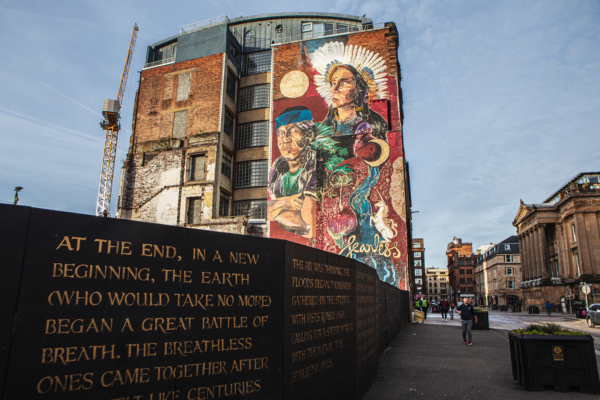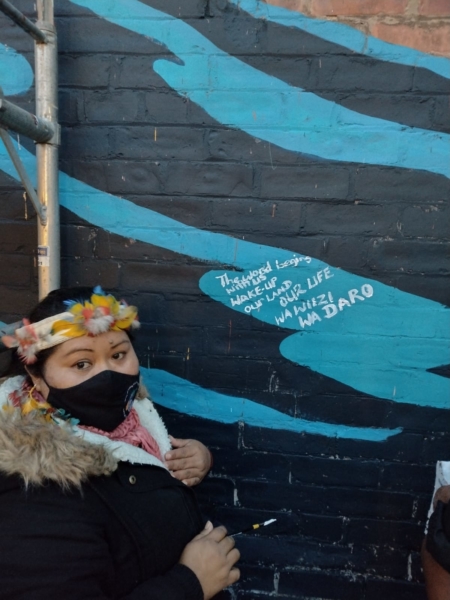COP Resistance Report 6: ‘We will outlive these empires’

Grief, rage, burnout, anguish, fear, despair, despondency are all perfectly rational responses to the failure of the planet’s most powerful people to place their immense resources in the service of life once again.
What might we take away from this experience? What comes next? One starting point is to note that the despair within the conference halls of COP26 has been countered by the possibilities enacted on the streets of Glasgow.
The city has excelled as a host for the growing movement for environmental and social justice: with countless fringe events taking over the city’s many warehouses, churches, office blocks and vacant spaces. Public buildings have been occupied, picket lines have come alive with diverse voices, mass political self-education has been a constant counterpoint to ignorant despair and passivity.
Where officialdom has failed to deliver, the people have stepped up: but to those who know Glasgow as a city that still wears its radical roots and the colours of international solidarity with pride, this shouldn’t come as a surprise.
Within the gated community of the summit, the presence of Indigenous Peoples and their allies has also set a defiant tone for the struggles and conflicts that this great failure of diplomacy will surely lead to. Of course, these delegations were outnumbered by representatives of the fossil fuel industry, a damning indictment of the UK Government’s priorities – that encapsulates the true (impossible) aim of the summit – to keep the extractive, exploitative workings of carbon capitalism intact while reducing global emissions.
As that old world crumbles under the weight of its own contradictions, what will it bring down with it? For many children, now facing a scenario in which the threshold 1.5 degrees of warming could be breached by 2030, there will be no ‘going home’ from COP26. Young people have been radicalised by the solidarity and inspiration from their brothers and sisters in the global south; who have looked them in the eye and told them about the death and destruction that capitalism has wrought on their homelands. The emerging political consciousness that has been on show is defined by an urgency that literally has no time to defer action: they want to uproot the system, they want loss and damages for the poorest, they want a different world.
One small symbolic shred of the courage required to build that world, and a fitting memorial to the ways that the people of Glasgow have opened their hearts and homes to a truly global movement can be found on Brunswick Street, in the Merchant City.
Glasgow’s latest mural is the work of Fearless Collective, a South Asia-based public art organisation led by women from the Global South. It depicts two leaders of the Indigenous Peoples who attended COP26.
Before a mass walk-out from the COP26 People’s Plenary earlier today, a spokesperson for the Indigenous Peoples Constituency offered up this message: “Colonialism is what caused climate change. I don’t believe in the power of colonial systems to transform. We will outlive this. We will outlive these empires.”
At the mural’s unveiling, Fearless Collective founder Shilo Shiv Suleman asked those in attendance to consider the many corners of the world where the image of Queen Victoria is pervasive.
With that legacy of colonialism in mind Fearless stated: ‘The mural is an image of power and sovereignty of indigenous leaders at COP26. Leaders of nations who have historically been unrecognised in spaces like this, stand tall and strong in the mural which is an affirmation of their existence and their wisdom.’
Tom Younger, Peru programme coordinator for the Forest People’s Programme, movingly underlined the mural’s significance as a memorial to the ongoing resistance of those on the frontline of climate breakdown:
“We are here in Glasgow’s so-called Merchant City, built on the wealth accumulated by the few from colonialism, the sugar and tobacco plantations in the Americas and Caribbean slavery, which ripped apart peoples, territories and their worlds across Africa and Turtle Island and Abya Yala,” he said.
“So it seems to me especially appropriate that hundreds of years later, Indigenous Peoples are here today in Glasgow, in the ruins left by that empire, to say you were never conquered. You resisted and continue to exist and sustain your territories of life and rebuild and expand your autonomies and self-governments,” he added.
The mural emerged from a workshop and discussion hosted by Fearless Collective which asked: What in this world do we want to end? How does this world begin again? With the assistance of Glasgow City Councillor Christy Mearns, the entire project was conceived and completed within the two weeks of COP26.
Answers to the latter question were painted on the Brunswick Street gable end by those in attendance.

Immaculata Casimero, Communications Officer for the South Rupununi District Council, an organisation that represents 21 Wapichan villages in Guyana, explained her contributon:
‘I said ‘Wake up.’ My wake up message is for those who are not conscious of what is happening around them in their daily lives. Sometimes we are too comfortable in our comfort zone,’ she said.
Immaculata also added ‘Our land our life.,’ because for Wapichan People, ‘our land is part of our lives and who we are.’ She also included the words – ‘Wa Wiizi, Wa Daro’ – which translates as ‘our land, our mother.’
As people everywhere look around them to consider the ideas, visions and values that will outlast the current global system, Immaculata’s words about visiting Glasgow speak to a broader desire for better ways to live:
“I want whoever looks at the mural, when they read it, to remember that I was here, even though my people weren’t, I was. I want them to have that in their thoughts that we will stand and protect this 1.6 million hectares of forest and to continue to mitigate climate change; this is our gift to the world, to our future generations and to all humanity.”
Cover image Fabrice Bourgelle. Image of Immaculata by Frances Jenner.

Help to support independent Scottish journalism by subscribing or donating today.

“Colonialism is what caused climate change. I don’t believe in the power of colonial systems to transform. We will outlive this. We will outlive these empires.”
Absolutely.
This system cannot save us from itself.
We can.
We are the system, Justin, and we will evolve through the contradictions inherent in our current relations of production. Ideologies of ‘salvation’ are the opium of the people; we must rather embrace the crises.
What Colin/Meg is really saying is; be good little boys and girls, don’t rock the boat, take your medicine, be compliant, the State knows best, don’t protest, don’t get angry.
What I’m actually saying as opposed to what I’m ‘really’ saying is that what’s driving the current revolution isn’t a conspiracy of evil men; it’s the totality of our current productive relations (‘capitalism’). The ‘problem’ is systemic rather than moral. Conspiracy narratives are – and always have been – consolations, the opium of the people.
‘Grief, rage, burnout, anguish, fear, despair, despondency are all perfectly rational responses to the failure of the planet’s most powerful people to place their immense resources in the service of life once again.’
Yes, these ritualised performances of public breast-beating do tend to be cathartic. I sometimes wonder whether that might be a function of such spectacles.
How much inconvenience and discomfort are you and I prepared to accept in order to slow the rate of heating of our planet? More than our leaders think we would? Less?
Could we make being rich a shameful thing? How much of my GB Pound is blood money?